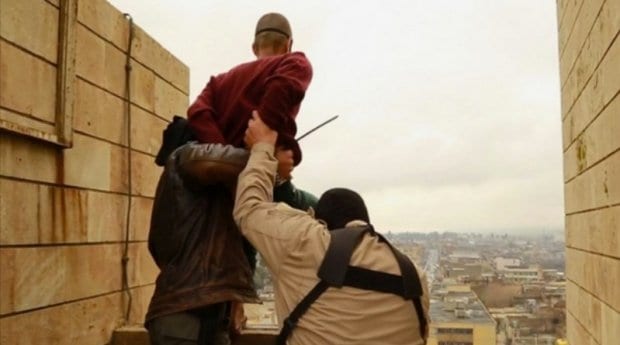The terrorist militant group known as the Islamic State has reportedly carried out a series of executions in the cities it controls in Syria and Iraq, targeting people who violate conservative civil laws governing homosexuality, adultery and banditry.
The method of execution varies, depending on the accusation: a woman accused of adultery was stoned to death, 17 men accused of banditry were crucified, and three men accused of homosexuality were thrown off tall buildings.
Twitter, the favourite online medium of ISIS members and supporters, saw the first announcement of such executions back in December 2014, when ISIS-affiliated accounts shared disturbing images of a group of men pushing a blindfolded man off a three-storey building. The location of the execution wasn’t immediately revealed; however, because of the background in the images, it is believed to have taken place in a small Iraqi village.
“The Islamic Court finds this man guilty of doing the acts of the people of Lott,” one image’s caption reads. “[The punishment] is to be thrown from the highest building in town, followed by rocks until death.”
“This is the fate of every Loutti on the land of the caliphate,” a message from pro-ISIS Twitter account @F_Sajwr reads. Loutti is a local derogatory term for homosexual men.
The December execution attracted little international interest, but the media-hungry ISIS recently carried out more horrific killings. At the end of the second week in January, images showing two blindfolded men being forced off a tall building in the city of Nineveh, Iraq, began to emerge. A group of armed fighters had herded a crowd of observers to witness the execution.
“If you look at ISIS’s history in Syria, you would see that they use terror to reign,” Mahmoud Hassino, a Syrian journalist explains. “I think they are targeting everyone, but homosexuals are the easiest target in the region because of the homophobic traditions and religions.” Other images shared by pro-ISIS Twitter users show the accused men struggling to remain on the edge of the building as others cheerfully push them off.
“This Loutti has been thrown from a high ground so he would be an example for those like him,” reads the caption of a photo, shared by @omermuaes2004, that shows a young man in mid-fall. “They all have to learn to Free Fall.”
Islam provides punishment guidelines for capital crimes such as theft, adultery and murder, but there is no definitive punishment for homosexuality in the Quran nor the Prophet Muhammad’s teachings. Islamic scholars confirm that the hadd (punishment) of throwing men accused of homosexuality off high ground and throwing rocks at them was invented in the early decades of Islam.
The hadd attempts to replicate the punishment mentioned in the Quran for the people of Sodom as mentioned in the narrative of that story in the Quran: “And We turned [the towns of Sodom in Palestine] upside down and rained down on them stones of baked clay.”
“As an LGBT person, I don’t think there was ever a move to help the LGBT community in the region, where it is really the most vulnerable group,” Hassino says in an interview on Facebook.
The International Gay and Lesbian Human Rights Commission and MADRE, a global women’s rights group, released a joint statement in which they “condemn the recent killing of at least five individuals by the Islamic State, two of whom were allegedly murdered for homosexual conduct.”
While the story has been widely reported as the execution of two gay men for homosexuality, the statement says, both organizations stress the need for accuracy in understanding the situation in the region, especially when it involves a marginalized sexual minority. “No information available to date can independently verify the facts of their sexual orientation or shed light on the conduct for which they were executed,” the statement notes.
A Syrian activist, who spoke on condition of anonymity for fear of retribution, says that accusing people of homosexuality is one of the many methods ISIS uses to justify executions.
“ISIS cleanses its own ranks of people they don’t like by accusing them of adultery, homosexuality or theft,” he says, his voice cracking during a Skype interview. “Daesh [a derogatory term used to refer to ISIS] uses such unconfirmed accusations to kill captured fighters from other rebel groups, disillusioned ISIS troops who disagree with the extremist methods, or civilians who refuse to stay within the limits set by them.”
Hassino, who has been monitoring the LGBT community in Syria and Iraq since 2003, suggests that the recent developments might inspire the community to react positively. “I think the LGBT communities in both countries will start to form an actual unity, and individuals will become more connected.”
Still, Hassino is guarded about his prognosis for the future of the region’s LGBT communities. “The traumas will haunt them for a long time. Living in fear will eventually have dire effects on them.”


 Why you can trust Xtra
Why you can trust Xtra


